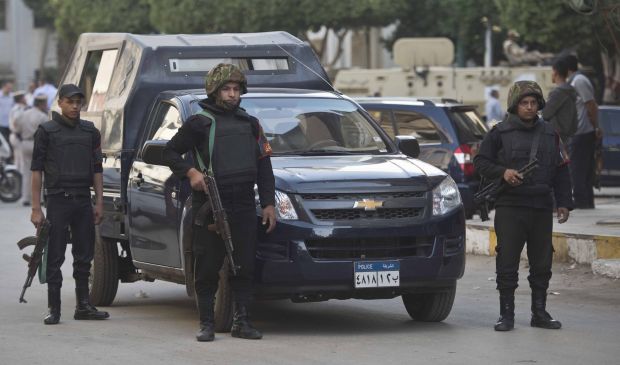
Members of the Egyptian security forces stand guard on a street in the southern city of Minya on April 28, 2014, after a court sentenced 682 alleged Islamists and a Muslim Brotherhood leader to death. (AFP/Khaled Desouki)
Cairo, Asharq Al-Awsat—After an Egyptian court sentenced 683 people including Muslim Brotherhood General Guide Mohamed Badie to death in a mass trial on Monday, the pro-Mursi Anti-Coup Alliance has threatened mass protests across the country.
The Brotherhood issued a statement on Monday describing the verdict as “disproportionately harsh and unjust,” adding that this represents a “final attempt [by the military-backed interim authorities] to terrorize the raging populace.” While the pro-Mursi Anti-Coup Alliance has called for mass protests against the decision, sparking fears of further social unrest in Egypt in the run up to presidential elections. In a statement also issued on Wednesday, the pro-Mursi alliance announced that protests would begin on Wednesday in front of the homes of some of those sentenced to death.
The Minya court sentenced a total of 683 supporters of former president Mohamed Mursi to death after being convicted of attacking Adawa police station and killing a police officer on August 14, 2013, following the dispersal of pro-Mursi sit-ins at Cairo’s Rabaa and Nahda squares. The offenders were found guilty on a number of charges including violence, rioting, attacking police officers, destroying public and private property, and inciting violence.
Death sentences in Egypt must be referred to the Grand Mufti—the highest legal religious authority in the land—before they can be carried out, with many analysts believing that Egypt’s Al-Ahram Institute will likely not ratify death sentences against Brotherhood leaders for fear of further inciting public unrest. However the Grand Mufti’s decision is ultimately non-binding, with the judiciary free to accept or reject it.
A judicial source, speaking to Asharq Al-Awsat on the condition of anonymity, said: “The decision of the Mufti [on death sentences] is advisory and non-binding and death sentences can be carried out even if the Grand Mufti rejects this.”
It is unclear whether Egypt’s military-backed interim authorities would seek to go against the highest religious authority in the country should Al-Azhar not ratify the decision.
Dr. Shawki El-Sayed, a prominent Egyptian constitutional and legal expert, informed Asharq Al-Awsat: “The opinion of the Grand Mufti must be sought in death penalty cases. This is a compulsory mechanism according to Egypt’s Code of Criminal Procedure which states that for death sentences to be legitimate, the case file must be sent to the Grand Mufti and he can give his opinion of the judgment—as a legitimate [religious] edict.”
Current Egyptian Grand Mufti Shawqi Allam was appointed in February 2013 and is viewed as being both moderate and apolitical. The court has set a June 21 deadline for the Grand Mufti to issue a decision and the final verdict to be passed.
The Minya court which sentenced 683 people to death on Monday is presided over by the same judge who previously sentenced 529 Brotherhood supporters to death in March. The judge confirmed death sentences against 37 Brotherhood supporters in the original mass trial on the recommendation of the Grand Mufti—commuting 492 other death sentences to life imprisonment.
The outlawed Muslim Brotherhood strongly condemned Monday’s mass death sentences, issuing a strongly-worded statement blaming Egypt’s military-backed interim authorities for the decision.
The statement began: “The illegitimate putschist regime in Egypt has clearly been frustrated by its utter failure to stop the Egyptian people’s Revolution to wrest their rights and reinstate legitimacy in their homeland.”
“The coup regime that attempts to strike fear and terror among the revolutionary people with vindictively unjust verdicts and harsh sentences, with absurdly long prison terms and mass death sentences, and without any proper due process or fair trials, is inevitably doomed to failure,” the statement added.
The White House said it was “deeply troubled” by the Minya court’s decision, adding that the ruling “defies even the most basic standards of international justice.”
US Secretary of State John Kerry is set to raise US concerns about the ruling in a meeting with Egyptian Foreign Minister Nabil Fahmi on Tuesday, Kerry’s spokeswoman said.
